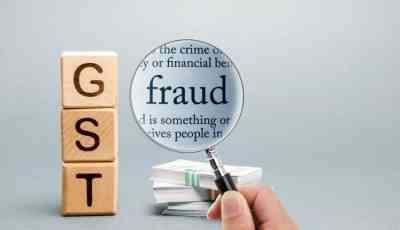GST fraud a new challenge for UP govt; Noida sees cases double in 3 yrs
In the last three years, GST fraud in Noida has doubled as irregularities have been detected in 291 cases of GST evasion, for which a fine of Rs 75.82 crore has been collected.

PAWAN TRIPATHI
Noida, April 23 (IANS) In the last three years, GST fraud in Noida has doubled as irregularities have been detected in 291 cases of GST evasion, for which a fine of Rs 75.82 crore has been collected.
According to the data of the Uttar Pradesh tax department, in the 2020-21 fiscal, a fine of Rs 18.04 crore was collected in 66 cases of tax evasion. In 2021-22, fraud worth Rs 11.56 crore was detected in 91 cases, while in 2022-23, 134 tax evasion cases were unearthed, in which a fine of Rs 45.72 was collected.
Talking to IANS, a state GST official said that fake tax invoice is like a fake note which is dangerous for the society. With a fake tax invoice, one can shrug off one's genuine liability. Tax invoice is like a currency note, if it is fake it will create trouble and the revenue collection of the government will take a hit, the official said.
He added that most of these irregularities are seen in sectors which are organised and informal, because they have no proper system like big companies. Big companies have proper accounting system and management, along with other systems which prevent these kinds of frauds.
But in most unorganised sectors or companies, these irregularities can be done very easily because there is no proper accounting system. And that's why frauds are seen in big scrap companies, steel and iron companies, pan masala companies, wholesalers of big goods, etc.
But smart tools and apps which have come up now can detect these irregularities. Besides, the field officers of the GST department are also keeping a close watch on such practices.
Sometimes decoding information in large networks manually is quite challenging, but if one decodes it through software or app, it can be cracked easily.
Companies evade GST when they sell goods but do not provide the bill. The common man can also prove to be helpful in stopping such malpractices by insisting for the bill.
When one does not take a bill, the seller can show that the product is still in the stock though it has been sold, and can easily generate a tax invoice of the same value and give it to anyone.
The cases of GST evasion by creating bogus firms are also increasing rapidly. Frauds worth crores of rupees have been carried out by getting GST registration done on the basis of fake address and documents. As per the figures, 22 bogus firms have been unearthed in 2020-21, 27 in 2021-22 and 58 in 2022-23.


 IANS
IANS 













